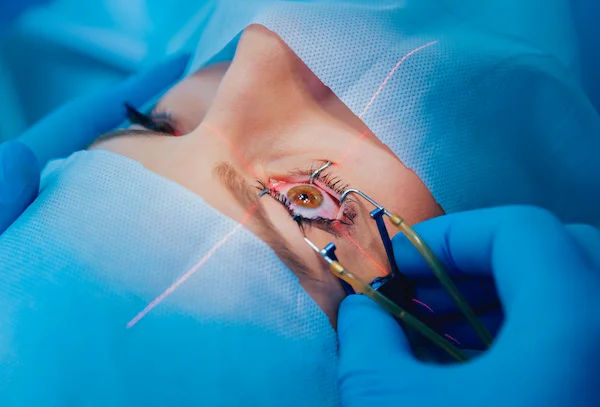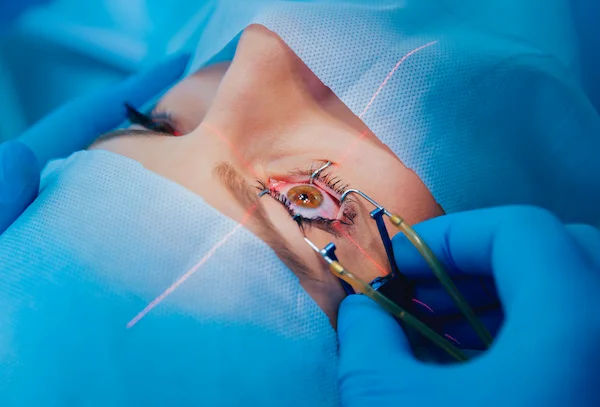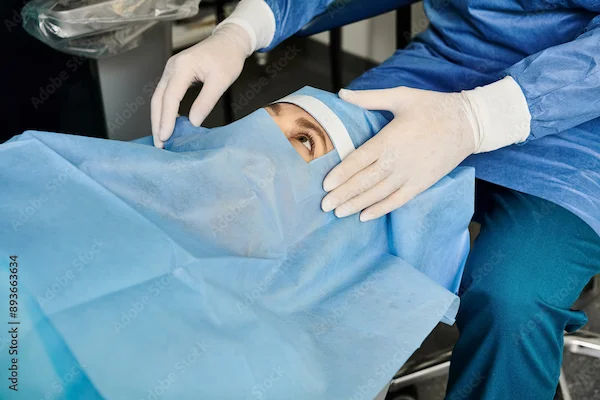Eye Twitching Causes & Prevention
Eye twitching is a common issue and it can occur due to several reasons. So, know its prevention strategies.

Written by Dr Sonia Bhatt
Last updated on 3rd Jul, 2025
Eye twitching or eyelid twitching is a common and relatively minor issue, typically occurring for a few seconds or hours. It is a type of recurring movement or spasm of the eyelid muscles. The actual cause of this eye disease is still unknown. But it can originate from the motor nerve of the brain. In many cultures, there are superstitions involved with eye twitching, saying twitching on the left eye is a sign of good luck and twitching on the right eye is a sign of bad luck. So, people shouldn't believe this type of superstition. Instead, they should follow proper precautions and consult a doctor if the situation worsens.
Causes of Eye Twitching
Some common causes of eye twitching are –
Stress: It is one of the major reasons behind eye twitching. Individuals who cannot manage stress must engage in stress-reducing activities like yoga and meditation.
Sleep Deprivation: If people get overly tired due to lack of sleep, they may settle for restorative sleep and start snoozing. This is another cause of eye twitching.
Caffeine and Alcohol: Consuming too much tea, coffee, soda, and alcohol can lead to eye twitching.
Dry Eyes: If someone has dry or irritated eyes, they can get eyelid twitching.
Vitamin Deficiencies: Lack of calcium, vitamin D and B12 may cause eye twitching.
Moreover, there are other causes, such as - smoking, environmental irritants, medications like clozapine, etc., that lead to this condition.
Medical Conditions Associated with Eye Twitching
Some of the leading medical conditions associated with eye twitching are –
Blepharospasm: There are two types of blepharospasm: primary and secondary. The primary type doesn't occur with any other underlying health concerns; it happens due to nerve-related conditions. However, the secondary type appears due to conditions like dry eye and light sensitivity.
Hemifacial Spasm: This is a neuromuscular disorder caused by blood vessels putting extended pressure on facial nerves. It starts with serial twitching on one eyelid. Gradually, it leads to one eye and the mouth becoming pulled to one side.
Dystonia: This is a movement disorder that causes involuntary muscle contractions that sometimes affect the eyes.
Parkinson’s Disease: This is another leading cause of eyelid twitching. Owing to the lack of dopamine production, this condition often lead to involuntary eyelid movement.
Multiple Sclerosis: This is another leading cause of eyelid twitching. The damaged nerves around the eyes due to this illness lead to the spasm or movement of the eyelid.
Symptoms and When to Seek Medical Attention
Individuals feel mild twitching when the eyelid muscles malfunction. In severe twitching, they experience forceful closure of the eyelids for seconds, minutes, or hours.
The situation becomes worse when –
The eyelid completely closes when each twitch happens
Twitching occurs in other parts of the face
The affected area feels weak
The eye is red or swollen, or discharge occurs
Difficulty in opening the eye
When eyelids are drooping
The twitching doesn't go away within a few weeks
After experiencing these symptoms, individuals should seek immediate medical attention to treat it.
Consult Top Ophthalmologist
Diagnosis of Eye Twitching
The diagnosis of eye twitching involves identifying its underlying causes through physical examination and medical history assessment. While occasional twitching is benign, persistent or severe symptoms may require a detailed evaluation.
The diagnosis begins with a comprehensive review of the patient’s medical history, where the doctors evaluate factors like stress, caffeine intake, sleep patterns, and medication use. Any history of neurological conditions or eye disorders is also reviewed. After that, an ophthalmologist examines the eyes for signs of dryness, irritation, or any structural abnormalities that could contribute to twitching.
However, if this condition persists, then doctors perform a neurological evaluation. They conduct imaging studies like MRI or CT scans to learn more about the underlying causes and then decide on the treatment options.
Treatment Options for Eye Twitching
The doctor may suggest medications or a treatment plan with botulinum toxin injections. This injection is given under the skin around the eyes. It relaxes the muscles underneath the adjacent areas of the eyes and reduces the spasms. Each set of injections prevents eye twitching for about three months. However, these injections have side effects, such as temporary double vision or eyelid drooping. In some rare cases, the doctor may recommend eye surgery.
Also, there are some home remedies and lifestyle modification strategies, such as –
Apply a warm compress on the eyes when twitching begins
The eyes should be lubricated with over-the-counter eye drops or artificial tears
Drinking less amount of caffeine, alcohol, and tobacco intake
Getting sufficient sleep. Try to go to bed at least 30 to 60 minutes earlier to reduce the eye strain
Eating a balanced diet
Preventive Measures
Some preventive measures for eye twitching are –
Managing Stress: Practising stress management techniques such as yoga, meditation, deep breathing, or engaging in relaxing hobbies proves to be extremely helpful. These habits significantly reduce the occurrence of eye twitching due to stress or anxiety.
Lowering Screen Time: Limiting screen time and following the 20-20-20 rule: every 20 minutes, looking at something 20 feet away for 20 seconds has proved to be extremely helpful. Also, using proper lighting during study and work helps lower the stress on the eyes.
Dietary Changes: Individuals need to opt for a balanced diet rich in magnesium, potassium, and vitamin B12 to support nerve health, which lowers eye twitching.
Getting Adequate Sleep: Ensuring 7 to 8 hours of quality sleep is important to fight eye twitching. It lowers the fatigue of the eyes, which is one of the main reasons behind this condition.
Avoiding Irritants: Minimising exposure to smoke, dust, and allergens helps as they can irritate the eyes and exacerbate twitching.
Eye Twitching in Different Populations
Sometimes, people inherit eyelid twitching from their family, but women between 40 and 60 are more likely to get it. Eye blinking may happen in children. Children younger than 16 suffer from this issue. The causes of eye blinking in children include problems with the cornea, refractive errors, misaligned eyes, or habitual tics.
Conclusion
Eye twitching is a relatively benign and temporary condition. But, at times, it can be a sign of underlying health issues as well. Therefore, by understanding its causes, symptoms, and associated medical conditions, individuals can take proactive steps to manage and prevent it. But, if the symptoms persist or worsen, seeking prompt medical evaluation is essential to address any potential underlying conditions. Together, this approach can help people improve their eye health and their overall well-being.
Consult Top Ophthalmologist
Consult Top Ophthalmologist

Dr Rajesh Rastogi
Ophthalmologist
33 Years • MBBS, MS Ophthalmology
New Delhi
Rotary Diabetic Centre, New Delhi
Dr. S Venkateswaran
Ophthalmologist
35 Years • MBBS, PGD (OPTHALMOLOGY)
Tiruvannamalai
Shiva Eye And General Hospital, Tiruvannamalai
(25+ Patients)
Dr. V.chittibabu
Ophthalmologist
30 Years • MBBS, MS
Vellore
Krupa Eye Clinic, Vellore

Dr. Sneha T Khurana
Ophthalmologist
9 Years • MBBS, MS Ophthalmology
Gurugram
GS multispeciality clinic, Gurugram
Dr. Akashdipta Saha
Ophthalmologist
4 Years • MBBS, MD(Ophthalmology), Fellowship in Retina & Vitreous
Delhi
AIIMS, Delhi
Consult Top Ophthalmologist

Dr Rajesh Rastogi
Ophthalmologist
33 Years • MBBS, MS Ophthalmology
New Delhi
Rotary Diabetic Centre, New Delhi
Dr. S Venkateswaran
Ophthalmologist
35 Years • MBBS, PGD (OPTHALMOLOGY)
Tiruvannamalai
Shiva Eye And General Hospital, Tiruvannamalai
(25+ Patients)
Dr. V.chittibabu
Ophthalmologist
30 Years • MBBS, MS
Vellore
Krupa Eye Clinic, Vellore

Dr. Sneha T Khurana
Ophthalmologist
9 Years • MBBS, MS Ophthalmology
Gurugram
GS multispeciality clinic, Gurugram
Dr. Akashdipta Saha
Ophthalmologist
4 Years • MBBS, MD(Ophthalmology), Fellowship in Retina & Vitreous
Delhi
AIIMS, Delhi



